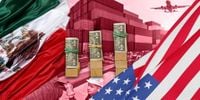Uncertainty surrounding trade policies is causing a significant slowdown in investment plans across both the United States and Mexico, particularly affecting the automotive sector. According to Alex Vásquez, an economic correspondent for Bloomberg News in Mexico, the unpredictability stemming from tariffs imposed by former President Donald Trump has created a climate of confusion for businesses.
In an interview with 'Aristegui en Vivo', Vásquez stated, "With Trump, everything related to his tariff policies is a great mystery." This statement encapsulates the frustration many investors feel as they navigate a landscape marked by inconsistent measures that often change with little notice. He pointed out that tariffs can be imposed one day and then delayed the next, leading to a lack of clarity that entrepreneurs find troubling.
The automotive industry, a crucial component of both economies, has been particularly impacted. Vásquez noted that while this sector is among the most adversely affected, its lobbying power in Washington could potentially influence future decisions. "I do believe we can expect that the lobby of large automotive companies will have an effect within the White House," he asserted, hinting at the possibility that concerns regarding the negative repercussions of these policies are being heard at the highest levels of government.
Beyond the automotive industry, the uncertainty has also stymied investment in real estate and other sectors in Mexico. Companies, such as BYD, have reportedly halted their investment plans in the country. Industrial developers are resorting to offering discounts to attract businesses, but these efforts have not yielded significant results.
Adding to the economic concerns, a recent survey conducted by the Bank of Mexico (Banxico) revealed that private sector specialists have drastically reduced their GDP growth forecast for Mexico in 2025 to just 0.41%, down from a previous estimate of 0.8%. This represents the lowest growth expectation in over a year. The forecast for 2026 has also been decreased to 1.59%, reflecting a cautious outlook amid ongoing uncertainties.
Despite a reported GDP growth of 1.5% in 2024, Mexico experienced a decline of 0.6% from October to December of that year, marking its first quarterly drop in three years. The adjustments made by these specialists come after a period of declining expectations, with some financial institutions, including Banamex, BNP Paribas, and UBS, predicting zero growth for the entire year of 2025.
Interestingly, while growth expectations have been slashed, the inflation forecast for the end of 2025 has slightly improved, now estimated at 3.72%, down from 3.75%. This change follows a report indicating that the inflation rate dropped to 3.67% in the first half of March, indicating a potential downward trend.
However, the private sector remains cautious. Factors hindering growth in the coming months include governance issues (40%), external conditions (29%), and internal economic conditions (25%). Specific concerns highlighted by experts include trade policy (19%), public insecurity (17%), and uncertainty regarding the internal economic situation (13%). These issues are compounded by the looming threat of new tariffs on Mexican exports, which Trump has hinted at announcing.
Despite these challenges, there is a slight improvement in the outlook for the Mexican peso. Specialists now estimate that the currency will close 2025 at 20.85 pesos per dollar, a minor adjustment from the previous projection of 20.88. For 2026, the estimate is 21.23 pesos per dollar, also a slight improvement from earlier predictions.
As the situation continues to evolve, the interplay between U.S. trade policies and Mexico's economic stability remains a critical focal point. The uncertainty surrounding tariffs not only impacts investment decisions but also poses risks to the broader economic landscape in both countries.
In summary, the current state of trade relations, particularly influenced by past U.S. policies, is causing significant ripples across the Mexican economy. With investment plans on hold and growth forecasts downgraded, the future remains uncertain. The automotive sector's influence in Washington may offer some hope for change, but until clearer policies emerge, businesses will likely remain in a state of limbo.






